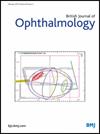The aqueous humour dynamics in primary angle closure disease: a computational study
IF 3.7
2区 医学
Q1 OPHTHALMOLOGY
引用次数: 0
Abstract
Purpose To create a computational fluid dynamics (CFD) model of ocular anterior segment for primary angle closure diseases (PACD) and assess the aqueous humour (AH) dynamics in different angle closure ranges (ACRs). Methods The ocular anterior segment geometry was obtained from an optical coherence tomography image by SOLIDWORKS. Three different angle opening distance at 750 µm from the scleral spur (AOD750) values were established to mimic three widths of anterior chamber angle. The AH dynamics were modelled using the Navier-Stokes equation. The 3D CFD model of the ocular anterior segment was created in COMSOL Multiphysics. The major outcome was the maximum flow velocity (MFV) and pressure in the ocular anterior segment. An in vitro simulation model was used to validate the computational results of the pressure and ACRs. Results The MFV and pressure both showed a non-linear association with ACR in the CFD models of PACD. The MFV and pressure started to elevate when ACR was larger than 180°, and increased dramatically when the ACR was larger than 270°. The in vitro experiment of the pressure changes was consistent with the CFD model. No significant differences of the MFV and pressure among the three AOD750 models. Conclusions The association among the ACR, MFV and pressure is an ascending curve in PACD, and ACR of 180° and 270° are two critical turning points. Our results are consistent with clinical phenomenon and may be used to provide better guidances for the clinical management of PACD in different stages. Data are available upon reasonable request. Data can be acquired from the corresponding author upon reasonable request.原发性闭角型角膜病的泪液动力学:一项计算研究
目的 为原发性角闭合疾病(PACD)创建眼球前段计算流体动力学(CFD)模型,并评估不同角闭合范围(ACR)下的泪液(AH)动力学。方法 通过 SOLIDWORKS 从光学相干断层扫描图像中获得眼球前段的几何形状。在距巩膜距 750 微米处建立了三种不同的开角距离(AOD750)值,以模拟三种宽度的前房角。AH 动态模型采用 Navier-Stokes 方程。眼球前段的三维 CFD 模型是在 COMSOL Multiphysics 中创建的。主要结果是眼球前段的最大流速(MFV)和压力。体外模拟模型用于验证压力和 ACR 的计算结果。结果 在 PACD 的 CFD 模型中,MFV 和压力均与 ACR 呈非线性关系。当 ACR 大于 180° 时,MFV 和压力开始升高,当 ACR 大于 270° 时,MFV 和压力急剧升高。体外实验的压力变化与 CFD 模型一致。三种 AOD750 模型的 MFV 和压力无明显差异。结论 在 PACD 中,ACR、MFV 和压力之间的关系是一条上升曲线,而 180° 和 270° 的 ACR 是两个关键转折点。我们的结果与临床现象一致,可为不同阶段 PACD 的临床治疗提供更好的指导。如有合理要求,可提供相关数据。如有合理要求,可向通讯作者索取数据。
本文章由计算机程序翻译,如有差异,请以英文原文为准。
求助全文
约1分钟内获得全文
求助全文
来源期刊
CiteScore
10.30
自引率
2.40%
发文量
213
审稿时长
3-6 weeks
期刊介绍:
The British Journal of Ophthalmology (BJO) is an international peer-reviewed journal for ophthalmologists and visual science specialists. BJO publishes clinical investigations, clinical observations, and clinically relevant laboratory investigations related to ophthalmology. It also provides major reviews and also publishes manuscripts covering regional issues in a global context.
文献相关原料
| 公司名称 | 产品信息 | 采购帮参考价格 |
|---|

 求助内容:
求助内容: 应助结果提醒方式:
应助结果提醒方式:


